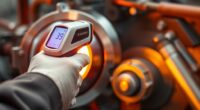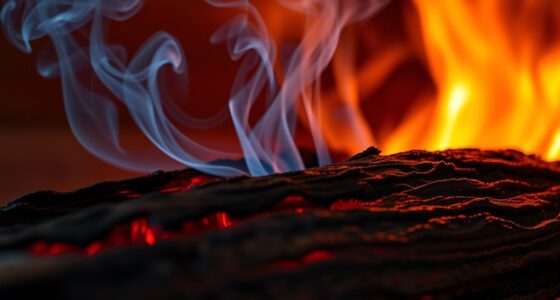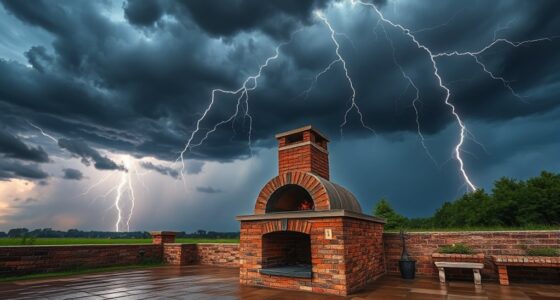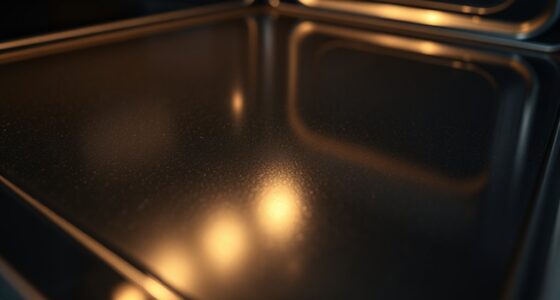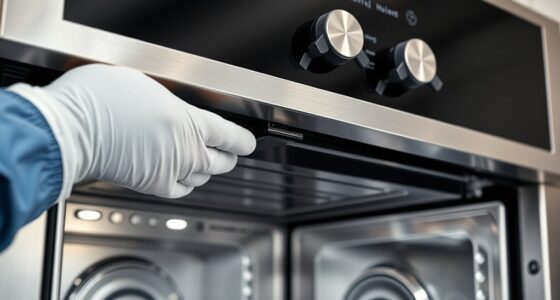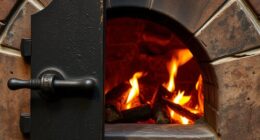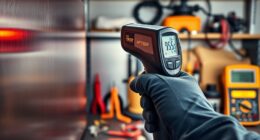To manage propane and gas lines safely, regularly inspect connections for leaks using soapy water or visual checks, and keep areas clear of debris or corrosive materials. Always turn off the gas supply before maintenance and use proper tools following manufacturer guidelines. Schedule periodic professional inspections to identify hidden issues early. Combining vigilant leak detection with routine line care helps prevent accidents. Keep exploring to learn essential practices that protect your property and loved ones from potential hazards.
Key Takeaways
- Regularly inspect gas lines for signs of damage, corrosion, or leaks using visual checks and soapy water tests.
- Install and maintain gas detectors to receive early alerts of leaks, ensuring prompt response.
- Turn off gas supply before performing any maintenance or repairs on lines or connections.
- Schedule professional inspections periodically to identify hidden issues and ensure compliance with safety standards.
- Keep areas around gas lines clear of debris and avoid using corrosive substances near gas infrastructure.
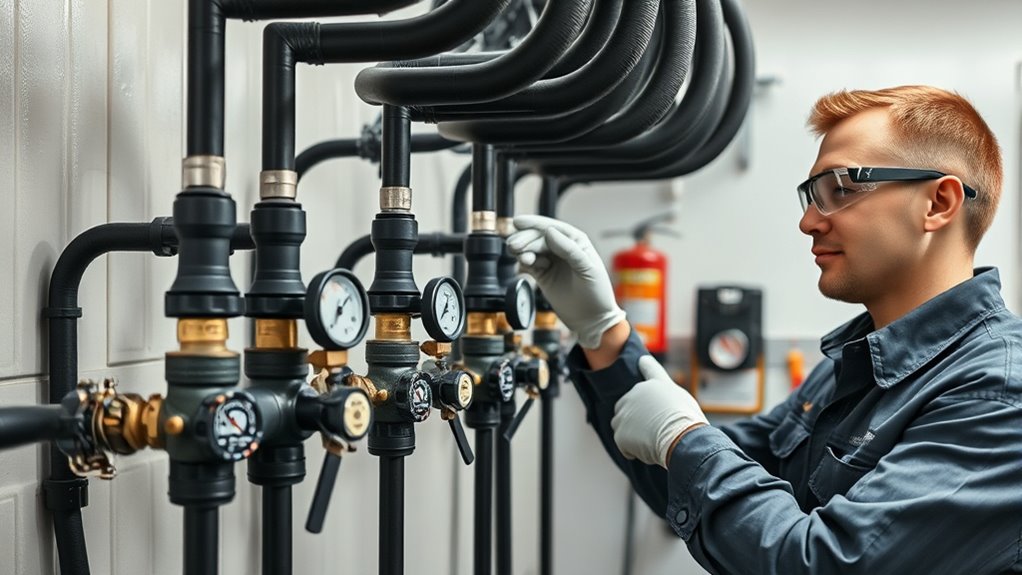
Properly managing propane and gas lines is essential for ensuring safety in your home or business. When it comes to gas systems, an ounce of prevention is worth a pound of cure. Regular leak detection and diligent line maintenance are key practices that can prevent accidents, reduce hazards, and keep your property safe. You should always be attentive to signs of leaks, such as a rotten egg smell or hissing sounds, and address them promptly. Installing gas detectors that alert you to leaks adds an extra layer of security, giving you peace of mind and early warning before a problem escalates.
Leak detection isn’t just about reacting to obvious signs; it’s also about proactive checks. You can regularly inspect your propane and gas lines for corrosion, cracks, or loose fittings. Use soapy water to test for leaks—applying it around connections and valves can reveal escaping gas through bubbles. If you discover a leak, shut off the gas supply immediately and call a professional. Never attempt to fix gas leaks yourself unless you’re qualified, because even small mistakes can lead to dangerous consequences. Proper leak detection routines help catch potential issues early, preventing costly repairs and dangerous situations.
Regularly inspect lines with soapy water for leaks and call professionals if needed.
Line maintenance is equally important. Over time, gas lines can degrade due to corrosion, environmental factors, or physical damage. Conduct routine inspections to ensure lines are secure and free from damage. Keep the area around your gas lines clear of debris and corrosive substances that could accelerate deterioration. When maintenance is needed, always turn off the gas supply before working on any line or connection. Use appropriate tools and follow manufacturer guidelines to avoid causing damage or creating future leaks. Regular maintenance not only prolongs the life of your gas lines but also minimizes the risk of leaks, explosions, or carbon monoxide buildup.
In addition to routine checks, consider scheduling periodic professional inspections. Certified technicians can perform thorough leak detection tests and ensure your line maintenance meets all safety standards. They can identify issues you might overlook and recommend necessary repairs or upgrades. Remember, never ignore the importance of proper line maintenance—neglecting it can lead to leaks that pose serious health and safety risks.
Ultimately, managing propane and gas lines safely involves a combination of vigilant leak detection and consistent line maintenance. By staying proactive, you protect yourself and everyone around you from potential dangers. Regular inspections, timely repairs, and the use of detection devices ensure your gas system operates safely and efficiently, giving you confidence that your property remains secure. Incorporating advanced detection methods can further enhance safety measures and provide comprehensive protection.
Frequently Asked Questions
How Often Should Gas Lines Be Inspected by Professionals?
You should have your gas lines inspected by professionals at least once a year for proper gas line maintenance. Regular inspection frequency helps identify potential leaks, corrosion, or damage early. If you notice any signs of trouble, like smell of gas or hissing sounds, call a professional immediately. Consistent inspections guarantee your gas lines stay safe, reliable, and compliant with regulations, giving you peace of mind.
What Are Common Signs of Gas Leaks to Watch For?
You should watch for common signs of gas leaks like a strong gas odor, a hissing sound near your lines, or the smell of rotten eggs. If you notice any of these, turn off the gas supply, evacuate the area, and call a professional immediately. Pay attention to any dead or discolored vegetation around your lines and a sudden increase in your gas bills, which could also indicate a leak.
Can I Install Gas Lines Myself or Should I Hire an Expert?
You shouldn’t attempt DIY installation of gas lines. It’s best to hire an expert because licensing requirements and safety standards must be met. Licensed professionals understand local codes and have the right tools to do the job safely. Attempting to install gas lines yourself can lead to leaks or dangerous accidents, risking injury or property damage. Always prioritize safety and hire a qualified expert for gas line work.
What Safety Equipment Is Recommended When Handling Propane Tanks?
Handling propane tanks requires proper safety gear, as studies show that most accidents involve inadequate protective equipment. Always wear gloves, safety goggles, and a face shield to prevent burns and leaks. Before working, conduct ventilation checks to guarantee no gas buildup. This gear and vigilance help you avoid hazards, ensuring safe handling and reducing the risk of dangerous leaks or explosions. Safety should always come first when managing propane tanks.
How Should I Respond if I Smell a Gas Leak?
If you smell a gas leak, your immediate action should be to evacuate the area to guarantee safety. Avoid using electrical switches or open flames to prevent sparks. Call emergency services right away and alert others nearby. Focus on leak prevention by shutting off the propane supply if you can do so safely. Your quick emergency response helps minimize risk and keeps everyone safe from potential hazards.
Conclusion
So, next time you’re tempted to ignore that hissing sound or forget to turn off the gas, remember—you’re not just risking a small spark, but possibly turning your home into a fireworks display. Think of yourself as the star of a safety sitcom, where a little caution keeps the drama on TV, not in flames. Stay vigilant, handle your propane with care, and avoid turning your peaceful home into a fiery inferno—because nobody wants an encore of that show.

